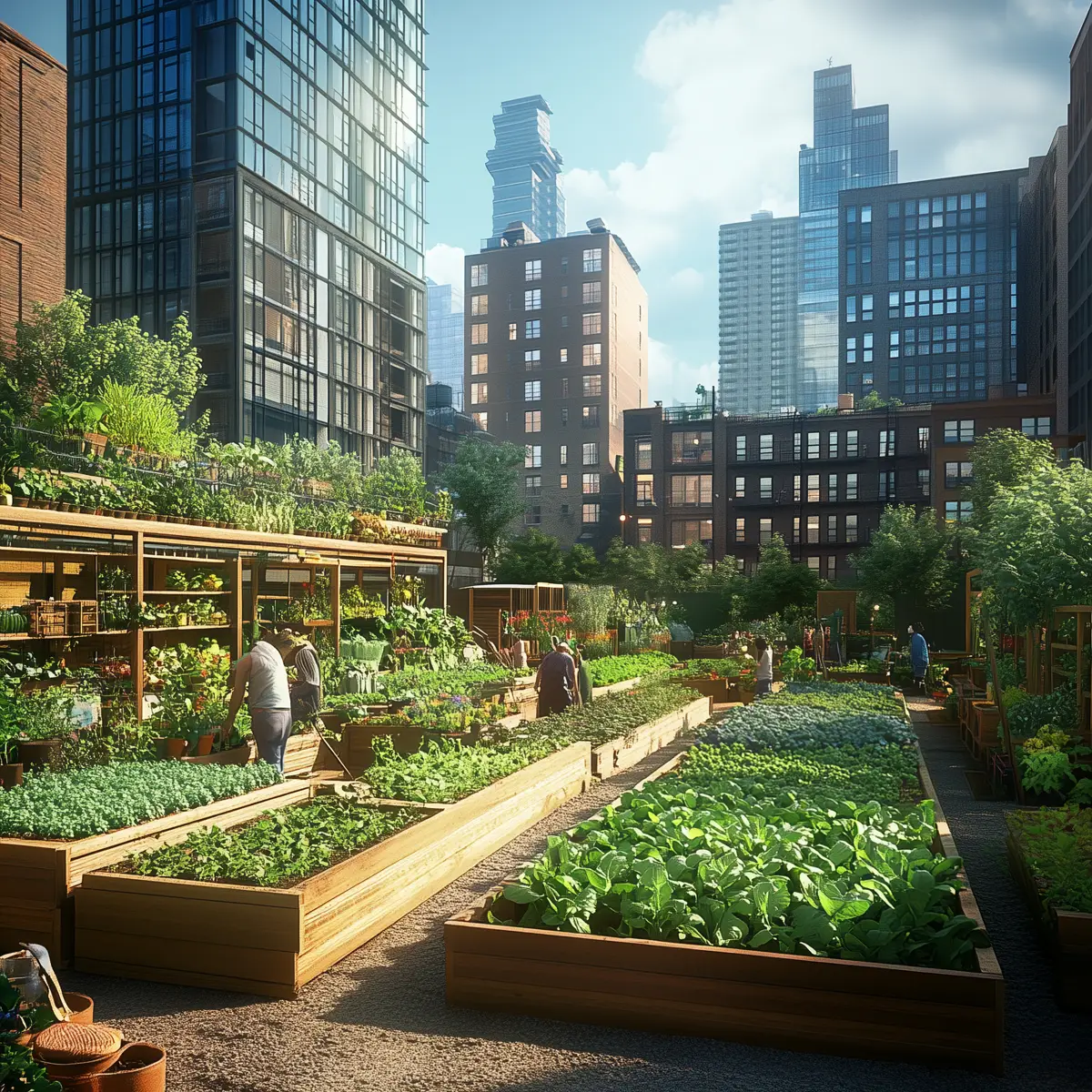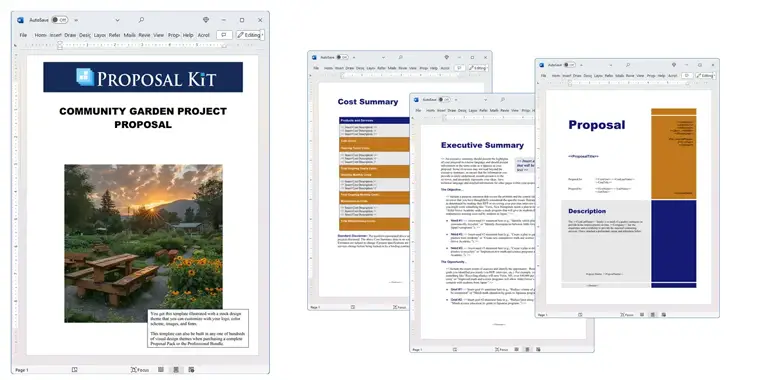How to write your Community Garden Project Proposal
We include this 25 page layout with every Proposal Pack. If you want this template to have a different visual design theme than the one illustrated here, purchase any Proposal Pack design and create this template using the purchased design theme. This template is included in every Proposal Pack. If you get a Proposal Pack or the Professional, you can also make any variation of this template with different chapters to suit your needs.
We typically include more chapters in the templates than most people will need to give everyone more variety in the chapters they may need. You can trim down a long template by removing pages you do not need or combining multiple chapter topics into one page.
 DOWNLOADABLE, ONE-TIME COST, NO SUBSCRIPTION FEES
DOWNLOADABLE, ONE-TIME COST, NO SUBSCRIPTION FEESYou can also create countless variations of this document to suit your needs using the included library of 2200+ chapters if ordering a Proposal Pack or Professional.
 What Our Clients Say
What Our Clients SayYour templates have helped me out far beyond what words could express. Thank you once again."
Related Article
Related Video
Related Templates
- Urban Farming Project Proposal
- Community Center Funding Proposal
- Reuse of Government Land Development Proposal
- Sponsorship of Non-Profit Proposal
- Community Self-Reliance Initiative Proposal
- Meals To Go Service Proposal Template
- Popup Kitchen Community Support Funding Proposal
- Community Self Reliance Initiative Proposal
- Standard of Living Improvement Proposal
- Organic Farming Product Sales Proposal
Writing Your Community Garden Project Proposal with Proposal Kit
Creating a compelling community garden project proposal can often appear challenging, particularly for those needing more experience in proposal writing. However, with the Proposal Kit template library and Wizard software program from Proposal Kit, drafting a persuasive and comprehensive gardening proposal becomes straightforward and manageable. This system simplifies the proposal writing process and integrates a line item quoting database for detailed financial aspects such as cost summaries, quotes, estimates, budgets, and other financial topics crucial for a community garden budget.
What is the Best Way to Write a Community Garden Project Proposal?
A proven approach to writing a community garden project proposal involves utilizing the Proposal Kit's extensive library of templates. This library provides a structured framework for detailing every aspect of your proposal, from the introduction to financial projections. It allows end users who may have yet to gain prior experience in proposal writing to produce a professional document that addresses all necessary points, including how to start a community garden, the project's objectives, and the anticipated impact on the community.
What Types of Projects Are Community Garden Project Proposals Written For?
Community garden projects can vary widely, with unique focus and objectives. Creating a proposal to pitch the project or secure funding is only one step in starting a community garden. Here are some examples of such projects:
- Creation of organic vegetable gardens for local consumption.
- Educational programs on sustainable gardening practices.
- Rehabilitate vacant lots into green spaces.
- Initiatives to promote biodiversity through native plant gardens.
- Youth gardening programs to teach agriculture and responsibility.
- Community composting programs to reduce waste and improve soil.
- Therapeutic gardens for mental and physical health benefits.
- Rainwater harvesting systems to sustain garden watering.
- Pollinator gardens to support bees and butterflies.
- Community orchards for fruit production and distribution.
Chapters this template is built with
Proposal Kit provides a range of templates to cover every aspect of your community garden project proposal.
Creating a community garden project proposal involves careful planning, detailed explanation, and strategic presentation of information to engage stakeholders effectively. Here's how you can expand on the critical components of the proposal using the Proposal Kit.
These templates are just a starting point; Proposal Kit offers thousands more to tailor your proposal to cover all necessary topics. Writing the proposal is just one step in setting up your project, but it's crucial for securing the support and funding needed.
Cover Letter
The cover letter is your first opportunity to connect with your audience personally. It should introduce your project while conveying your passion and commitment. Mention why the community garden is essential to you and the community and how it aligns with your reader's values or interests. This personalized approach sets the tone for the proposal and encourages the reader to engage with your vision.
Introduction
The introduction sets the stage for the entire proposal by providing a snapshot of what the reader can expect. It should briefly describe the project, its significance, and the benefits it will bring to the community. The introduction is your chance to grab the reader's attention and pique their interest in learning more about your community garden project.
Executive Summary
The executive summary succinctly outlines your project's key points and benefits, summarizing the most compelling arguments for why the project should be supported. This section should highlight the need for the community garden, its goals, and its positive impact, making it clear why the project deserves attention and funding.
Project Cost Summary
A detailed project cost summary is crucial for transparency and establishing trust with potential funders. It outlines the financial requirements and projections, including initial setup costs, ongoing maintenance expenses, and other economic considerations. Providing a clear, itemized budget helps stakeholders understand how funds will be allocated and the project's financial sustainability.
Next Steps
After presenting your proposal, the next steps section guides the reader through the process. It may include a call to action, such as a request for funding, suggestions for partnership opportunities, or a timeline for decision-making. This part of the proposal aims to convert the reader's interest into concrete action.
Location Analysis
This section evaluates the proposed site for the garden, considering factors like sunlight exposure, soil quality, water access, and community accessibility. A thorough location analysis demonstrates that you have conducted the necessary due diligence to ensure the project's success and sustainability.
Goals and Objectives
Clearly articulating the community garden project's goals and objectives is essential. This section should outline what the project aims to achieve, such as improving community health, providing educational opportunities, or enhancing local biodiversity. Specific, measurable, achievable, relevant, and time-bound (SMART) objectives can help clarify the project's direction and success criteria.
Funding Plan
The funding plan describes potential sources of financial support and strategies for securing those funds. It may include grants, donations, sponsorships, or fundraising events. A well-thought-out funding plan shows potential funders that you have a viable strategy for making the community garden a reality.
Site Planning and Preparation
Detailing the logistical aspects of establishing the garden is crucial. This includes site clearance, soil preparation, infrastructure development (paths and water supply), and construction work. A comprehensive site planning and preparation section demonstrates your readiness to proceed with the project.
Layout, Parking, Zoning, Regulations
Addressing technical and regulatory considerations ensures the project complies with local laws and regulations. This section should cover the garden layout, parking facilities (if applicable), zoning requirements, and other regulatory hurdles. It shows that the project is feasible and has considered all necessary legal and logistical factors.
Community and Self-Sufficiency
Explaining how the project will benefit and involve the community underscores the social value of the community garden. This section can describe community engagement strategies, opportunities for residents to participate, and how the garden will contribute to the community's self-sufficiency, such as through food production or educational programs.
Projected Expenses
Providing a detailed breakdown of expected costs gives stakeholders a clear understanding of the project's financial aspects. This should include both one-time and ongoing expenses, offering a comprehensive view of the financial commitments required for the garden's establishment and maintenance.
Mission Statement
The mission statement articulates the guiding principles and goals of the community garden project. It serves as a declaration of the project's purpose and values, setting the foundation for all activities and decisions related to the garden. A strong mission statement can inspire support and engagement from the community and potential funders.
Use cases for this template
A Small Business Owner's Path
Julia's journey with Green Spaces Collective began with a dream of green, vibrant spaces where concrete once dominated. The unused plot of land she eyed for transformation was more than just a space; it was an opportunity to foster community spirit, educate the public on sustainable practices, and provide fresh produce to local families.
With the Proposal Kit, Julia meticulously outlined each aspect of her vision, from the initial clean-up and design phases to the operational plan for community involvement and educational workshops. She detailed the costs involved, breaking them into understandable segments, such as soil preparation, seedlings, tools, and water systems, ensuring transparency in her financial needs.
Her proposal included compelling visuals and testimonials from community members who supported the project, making her case logical and emotionally resonant. When she presented her gardening proposal to the local council and community stakeholders, the combination of detailed planning, heartfelt storytelling, and transparent budgeting won them over. The support and funding she received were not just for the garden but for the promise of a more cohesive, healthy, and green community.
Corporate Responsibility in Action
Leo's assignment to create a compelling proposal under a strict deadline was a race against time. He knew EcoFriendly Corp's commitment to community and sustainability must shine through every document page. Using the Proposal Kit, Leo structured his proposal to highlight the mutual benefits of the local garden project: environmental restoration, community engagement, and positive brand association for EcoFriendly Corp.
He supplemented his narrative with data and projections on how the garden could reduce carbon footprint, promote biodiversity, and serve as a green oasis in an urban setting. AI writing tools assisted Leo in generating coherent, persuasive content that aligned with the company's values, enabling him to weave in the latest sustainability trends and success stories from similar initiatives.
The final document was a testament to EcoFriendly Corp's dedication to corporate responsibility, showcasing a detailed plan for the garden's development, from site selection to volunteer engagement and future expansion. Leo's ability to deliver such a comprehensive proposal under tight deadlines showcased the efficiency of Proposal Kit, bolstering his reputation and demonstrating the company's serious commitment to making a tangible difference in the community.
Government Agencies Growing Together
Ava's challenge was to create a framework that would invite and excite potential partners about the prospect of contributing to the city's greening efforts through community gardens. The Proposal Kit enabled her to draft an RFP that was both inviting and informative, detailing the city's goals for food security, community health, and environmental sustainability. She outlined the scope of the projects, specifying the number of gardens, their intended sizes, and the variety of plants each would support, from vegetables and herbs to native flowers and trees.
The financial section of her proposal was transparent and detailed, offering potential contractors insight into the city's budgeting process, funding sources, and expected contributions from participants. Ava included success metrics for each garden, such as community engagement levels, pounds of food produced, and increases in local biodiversity, setting clear expectations for interested parties.
The comprehensive nature of the RFP, combined with its clear vision and structured financial plans, made it an attractive opportunity for companies specializing in urban agriculture and community development. The successful bids reflected a shared vision for a greener, more sustainable city, demonstrating the effectiveness of Ava's meticulous planning and the Proposal Kit's capabilities in bringing diverse stakeholders together for a common cause.
Conclusions and Recommendations
Whether you are a small business owner, a corporate employee, or a government official, the Proposal Kit offers the tools and guidance necessary to develop compelling proposals to turn the dream of community gardens into a reality. By leveraging this comprehensive toolkit, you can overcome the challenges of proposal writing and contribute to creating sustainable, vibrant, and healthy communities.
Also Known As
This template may also be referred to in different ways or be used in more specialized situations, such as:
- Community Green Space Initiative Proposal
- Neighborhood Garden Collaboration Plan
- Urban Agriculture Development Proposal
- Local Food Production Project Plan
- Community Horticulture Venture Proposal
- Public Gardening Project Submission
- Sustainable Urban Garden Scheme Proposal
- Local Gardening Engagement Plan
- Community Cultivation and Wellness Project
- Neighborhood Farming Initiative Proposal
Abstract
 Creating a project proposal for a community vegetable garden becomes a straightforward task with the help of Proposal Kit's templates and software. These tools offer a structured framework to support individuals and nonprofit organizations in implementing their ideas. Through detailed templates, users can illustrate the importance of the community garden project, its aims, and its positive impact on nutrition and life quality for citizens, including training for children and adults.
Creating a project proposal for a community vegetable garden becomes a straightforward task with the help of Proposal Kit's templates and software. These tools offer a structured framework to support individuals and nonprofit organizations in implementing their ideas. Through detailed templates, users can illustrate the importance of the community garden project, its aims, and its positive impact on nutrition and life quality for citizens, including training for children and adults.
Proposal Kit also simplifies the financial topics of the proposal, ensuring that budgets for planting, landscape design, and ongoing maintenance are clear and clear.
The history of community gardens highlights their role in fostering art and cultural expression while promoting healthy lifestyles. Developing a comprehensive plan requires attention to various topics, from site analysis and funding strategies to community engagement and self-sufficiency goals. Users can implement actionable steps to transform vacant lots into thriving green spaces, demonstrating the project's potential to enhance local nutrition and biodiversity. The Proposal Kit ensures that all necessary components are covered, making it easier to secure support and funding for the project.
 The role of community gardens extends beyond mere planting; they serve as educational platforms where children learn the importance of sustainable practices. Training sessions can be organized to empower citizens with the skills needed for effective gardening. These gardens also contribute to the local landscape, offering a green oasis in urban settings and fostering community spirit. By engaging in community gardening, participants not only improve their nutrition but also gain a deeper appreciation for art in nature. As these projects are developed, implementing well-thought-out plans can lead to long-term success, ensuring that community gardens become integral to urban life.
The role of community gardens extends beyond mere planting; they serve as educational platforms where children learn the importance of sustainable practices. Training sessions can be organized to empower citizens with the skills needed for effective gardening. These gardens also contribute to the local landscape, offering a green oasis in urban settings and fostering community spirit. By engaging in community gardening, participants not only improve their nutrition but also gain a deeper appreciation for art in nature. As these projects are developed, implementing well-thought-out plans can lead to long-term success, ensuring that community gardens become integral to urban life.
Community gardens stand as vibrant examples of how urban spaces can be transformed into productive and educational environments. These projects, often spearheaded by nonprofit organizations, emphasize the importance of creating a sustainable food source while fostering a sense of community. By implementing gardens, neighborhoods can improve access to fresh produce, enhance local biodiversity, and provide educational opportunities through training programs. Such initiatives not only aim to improve physical health but also enrich the social life of citizens by fostering a collective spirit of collaboration and shared responsibility.
The historical evolution of community gardens showcases their ability to bring diverse groups together, often blending cultural history with contemporary needs. These gardens serve as living classrooms where children and adults alike can learn about sustainable agriculture and the environmental benefits of urban greenery. The educational topic extends beyond just planting techniques; it involves understanding the ecosystem and the critical role pollinators play in our environment.
 By developing these projects, communities create spaces that reflect the art of gardening, integrating design topics that enhance visual appeal while ensuring practical utility. The landscape becomes a canvas where nature and human creativity intersect, offering both aesthetic beauty and functionality. As gardens flourish, they contribute to a community's self-sufficiency, reducing reliance on external food sources and encouraging local food production.
By developing these projects, communities create spaces that reflect the art of gardening, integrating design topics that enhance visual appeal while ensuring practical utility. The landscape becomes a canvas where nature and human creativity intersect, offering both aesthetic beauty and functionality. As gardens flourish, they contribute to a community's self-sufficiency, reducing reliance on external food sources and encouraging local food production.
Implementing a community garden requires careful planning and a cohesive strategy that aligns with local regulations and community goals. The Proposal Kit supports this by offering templates that address every topic of garden proposal development, from site planning to funding strategies. By using these tools, individuals and organizations can convey their vision, secure necessary resources, and ensure the project's long-term sustainability. Through community gardening, cities can cultivate not only food but also a sense of belonging and stewardship, thus promoting a healthier, more connected urban life.
Frequently Asked Questions
What should I include in a community garden project proposal?
When writing a community garden project proposal, it is crucial to include several key components: an introduction that explains the purpose and goals of the garden, a detailed project plan that outlines the garden's design and layout, a budget that itemizes costs and potential funding sources, a timeline that highlights significant milestones, and a section on community involvement that describes how the garden will engage and benefit residents. Addressing these components will ensure that the proposal is comprehensive and compelling.
How do I demonstrate community support for the project?
Include letters of endorsement from local residents, businesses, and organizations to demonstrate community support. Additionally, present the results of surveys or petitions that show widespread interest and backing. Hosting community meetings or workshops and documenting attendance and feedback can also serve as strong evidence of community buy-in. The more tangible and diverse the support, the more your proposal will be more persuasive.
What are the challenges in writing a community garden proposal, and how can they be addressed?
Common challenges include defining a clear vision, securing funding, and ensuring long-term sustainability. To address these, develop a solid mission statement and articulated goals. Local partnerships for financial or in-kind support should be considered regarding funding, research, and applying for grants. For sustainability, develop a detailed maintenance plan and involve the community in its ongoing management by setting up a volunteer schedule or forming a garden committee.
How do I create a realistic budget for the community garden project?
To create a realistic budget, list all potential expenses, including land acquisition or rental, soil and compost, seeds and plants, tools and equipment, fencing, water access, and any initial labor costs - research prices to get accurate estimates and consider talking to other community garden organizers for insights. Include a contingency fund for unexpected expenses and identify potential funding sources, such as grants, donations, or community fundraisers, to show how you plan to finance the project.
How do I ensure the long-term success of the community garden?
Ensuring the long-term success of the community garden involves planning for sustainability from the start. Develop a governance structure, such as a garden committee, to oversee operations and maintenance. Create a membership or volunteer system to foster ongoing community involvement. Establish guidelines and schedules for garden care and organize regular meetings to address issues and share successes. Seeking partnerships with local schools, businesses, or non-profits can also provide additional resources and support to sustain the garden over time.
20% Off Discount
![]() Add To Cart This Word Template
Add To Cart This Word Template
 Add To Cart Proposal Pack for Any Business
Add To Cart Proposal Pack for Any Business
 Add To Cart Proposal Kit Professional
Add To Cart Proposal Kit Professional
 4.7 stars, based on 849 reviews
4.7 stars, based on 849 reviewsProposal Kit chapters used in this template
Cover Letter, Title Page, Table of Contents, Introduction, Executive Summary, Goals and Objectives, Self-Sufficiency, Community, Membership, Location, Parking, Layout, Location Analysis, Site Planning, Site Preparation, Regulations, Zoning, Projected Expenses, Funding Plan, Project Cost Summary, Recommendations, Next Steps, About Us, Mission Statement, Back Page
Line Item Automated Chapters
If you purchase a Proposal Pack or the Professional Bundle, these proposal pages are generated using an automated line-item database in the included Wizard software.
Project Cost Summary
You use this proposal for
- General business proposal
- Non-technical proposal
- Project pitch proposal
- Non-government grant, non-profit, NGO proposal
- Spiritual, church, community proposal
- Food, beverage, catering, grocery proposal
- Agricultural proposal
How to create this template with Proposal Pack Wizard
You can create this document using any of the logo-designed Proposal Packs. Pick any Proposal Pack with a logo design theme you like best; they will all work equally well. The Proposal Pack for Any Business is the pack with no extra added logos or colors - designed to be used plain or for you to customize with your logos and graphics.
The Proposal Pack design theme you purchase will determine the visual look of this template. The screenshot above only shows the plain generic design theme.
We include a library of chapters to be assembled based on your needs. All proposals are different and have different needs and goals. We designed Proposal Pack so you can customize the documents to suit your needs.
You will best create this document using the Proposal Pack Wizard - Expert Edition software to select this template and build it in the Proposal Pack logo design theme of your choice along with any desired customizations (such as adding additional chapters, removing unneeded chapters, changing the order of chapters, and importing your company logo). This template outlines a proposal for the described situation. Each user is responsible for typing in the actual content of the provided pages with their information to complete the proposal. Suggestions in the abstract may include features in higher-end packages and are facilitated by the selection of chapter templates to support the narrative of each proposal, which help guide the user in filling in the details.
The Wizard software's AI Writer will write the content of the pages of the template based on details provided for your company, client, project, financial details and other writing instructions. This will provide a personalized version of the template completely written and ready to edit.
Once finished, the AI Writer's Word-to-PowerPoint converter can transform your proposal, business plan, or other business documents into a PowerPoint slideshow. Save time and effort by letting the AI analyze every chapter to condense its content into talking points, visually matching the document, and providing a consistent package of presentation material with the click of a button.
You create this template using the Wizard software with an entire Proposal Pack library and software. We include the Expert Edition of the software in the Proposal Kit Professional. Microsoft Word for Windows is required to use the customizing software. You can also edit Word document templates in other office software such as Word for Mac. We will assist Mac users in assembling complex templates for their first project if they do not have the required platform to run the Wizard software.
How to Build Templates Featured on Proposal Kit Website
Many people find the Proposal Kit website after searching for a specific proposal. Once you've purchased and installed the software, how do you build that template you found in the first place? This video shows you how to build any proposal you see on the Proposal Kit website.
 Ian Lauder has been helping businesses write their proposals and contracts for two decades. Ian is the owner and founder of Proposal Kit, one of the original sources of business proposal and contract software products started in 1997.
Ian Lauder has been helping businesses write their proposals and contracts for two decades. Ian is the owner and founder of Proposal Kit, one of the original sources of business proposal and contract software products started in 1997.By Ian Lauder
 Published by Proposal Kit, Inc.
Published by Proposal Kit, Inc.


 Cart
Cart
 Get 20% off ordering today:
Get 20% off ordering today: 


 Facebook
Facebook YouTube
YouTube Bluesky
Bluesky Search Site
Search Site